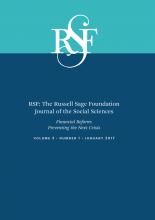Abstract
Understanding the implications of algorithmic trading calls for modeling financial markets at a level of fidelity that often precludes analytic solution. We describe how agent-based simulation modeling can be combined with game-theoretic reasoning to examine the effects of market variables on outcomes of interest. The approach is illustrated in a basic model where investors trade a single security through a continuous double auction mechanism. Our results demonstrate the feasibility of the approach, and raise questions about the use of spreads as a proxy for trading cost and welfare.
- Copyright © 2017 by Russell Sage Foundation. All rights reserved. Printed in the United States of America. No part of this publication may be reproduced, stored in a retrieval system, or transmitted in any form or by any means, electronic, mechanical, photocopying, recording, or otherwise, without the prior written permission of the publisher. Reproduction by the United States Government in whole or in part is permitted for any purpose. Direct correspondence to: Michael P. Wellman at wellman{at}umich.edu, 2260 Hayward St., Ann Arbor, MI 48109; and Elaine Wah at elaine.wah{at}iextrading.com.
Open Access Policy: RSF: The Russell Sage Foundation Journal of the Social Sciences is an open access journal. This article is published under a Creative Commons Attribution-NonCommercial-NoDerivs 3.0 Unported License.






